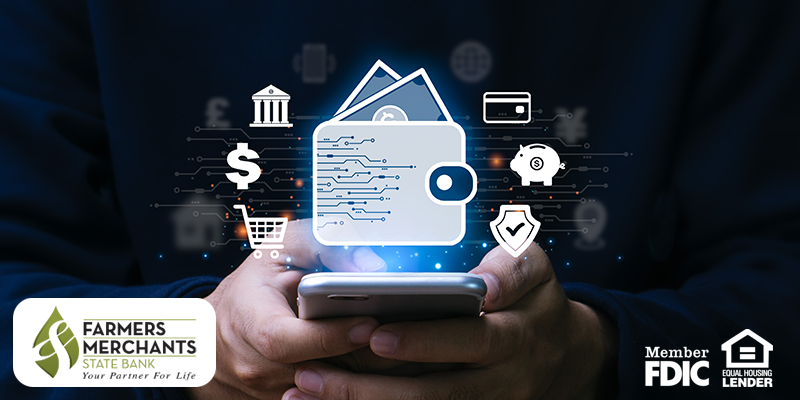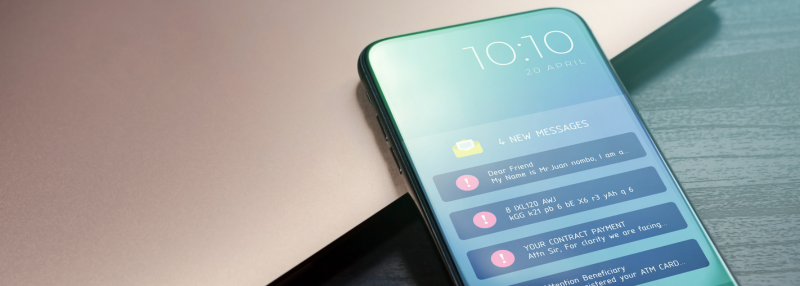
Farmers & Merchants State Bank
Updated Thu September 4, 2025
Published Under: Cybersecurity

Scammers are everywhere these days, and unfortunately, they’re getting smarter. From text messages pretending to be your bank, to AI “deepfake” phone calls that sound like a loved one, fraud tactics are evolving fast.
The good news? With the right knowledge, you can protect yourself and your money. At Farmers & Merchants State Bank, we’re committed to keeping our customers in Waterloo, Lake Mills, Marshall, and beyond safe, not just in the branch, but online, over the phone, and in daily life.
This guide covers the top scams and fraud to watch out for in 2025, how to spot them, and what to do if you ever find yourself a target.
Quick-Jump Menu (Click to Jump)
- Why Scam Awareness Matters for Wisconsinites
- 1. Bank Impersonation & Spoofing Scams
- 2. Phishing Emails & Smishing Texts
- 3. IRS & Tax Scams
- 4. Grandparent/Impostor Emergencies
- 5. Tech-Support Pop-ups
- 6. Romance & “Pig-Butchering” Investment Scams
- 7. Fake Jobs, Side-Gigs & Employment Overpayments
- 8. Charity & Disaster Relief Scams
- 9. Check Fraud: Fake Checks, Overpayments & Check-Washing
- 10. Marketplace & Delivery Scams
- 11. QR Code & Crypto-ATM Payment Traps
- 12. AI Voice/Video Deepfakes
- 13. Scams Targeting Seniors (Elder Financial Exploitation)
- 14. Scams Targeting Students & Young Adults
- What to Do Right Now if You’re Targeted
- How F&M Has Your Back (Online & In-Branch)
- Quick Red-Flag Checklist
- Resources for Continued Learning
Why Scam Awareness Matters for Wisconsinites
Fraud isn’t just happening “somewhere else.” It’s happening here in Wisconsin. The Wisconsin Bankers Association recently warned about a rise in bank spoofing scams targeting customers in local communities. State officials also report increasing complaints of impostor scams, fake IRS calls, and online romance fraud.
In 2024, Americans lost over $12 billion to scams, and 2025 is on track to be even higher. That’s money that could have stayed in family savings accounts, retirement funds, or college plans.
By staying informed and sharing what you learn with family and friends, you can help make our whole community safer.
1. Bank Impersonation & Spoofed Calls/Texts ("It's your bank—act now!”)
How it works: Scammers copy a bank’s name/logo and spoof caller ID so the call or text looks like it’s from F&M. They’ll say there’s “fraud on your account,” then push you to share login codes or move money to a “safe” account.
Red flags
- Urgent tone (“Do this now or your account will be closed”).
- Requests for passwords, one-time codes, PINs, or full debit card numbers.
- Links to “verify” your account.
What to do instead
- Stop. Don’t click, tap, or reply.
- Call us back using the number on your debit card, statement, or fandmstbk.com (not the number that called you).
- Turn on two-factor authentication in online banking.
A local note:
Wisconsin authorities (including the Wisconsin Bankers Association and DATCP) are reporting an uptick in bank spoofing and impostor texts, so staying scam-smart really matters here at home.

2. Phishing Emails & Smishing Texts
How it works: Emails or texts pretend to be from Amazon, your bank, USPS, or even the DOT—“verify your info,” “package held,” “account locked,” or “overdue toll.” You click a link, enter login/SSN/payment…and the scammers have it.
Red flags
- Spelling/grammar errors; odd sender addresses (e.g., [email protected]).
- Links that don’t match the brand’s real website (long or weird domains).
- “Final notice” or threats in the message.
What to do
- Go directly to the company site/app—don’t use the message link.
- Delete the message or forward phishing to the FTC or the brand’s abuse address.
- For Wisconsin “overdue toll” texts (E-ZPass/WisDOT imposters): delete and report—DATCP has a specific warning.
3. IRS & Tax Scams (texts/calls about “overdue” taxes or refunds)
How it works: Callers/texts claim to be the IRS with threats of arrest, suspended SSN, or “click here for your refund.”
Reality check: The IRS does not initiate contact by text, email, or social media asking for personal or financial info. First contact is by mail.
Red flags
- Payment demands via gift cards, crypto, or wire.
- Pressure to act without verifying.
What to do
- Log in at IRS.gov to check real notices.
- Report phishing to the IRS (instructions on their site).
4. Grandparent/Impostor Emergencies
How it works: “Grandma, it’s me—don’t tell Mom. I’m in trouble and need cash now.” Scammers sometimes use spoofed caller ID or AI-cloned voices to sound convincing.
Red flags
- Secrecy + urgency.
- Requests for wire/gift cards/cash.
What to do
- Hang up and call the real person (or another trusted relative) on a known number.
- No confirmation = no money.
5. Tech-Support Pop-Ups & "Your device is infected"
How it works: A scary pop-up claims your computer/phone is infected. It gives a number to call or a link to “fix it,” which installs malware—or the “tech” sells you fake support.
Red flags
- Unsolicited calls or pop-ups demanding remote access.
- Requests for credit card info to “clean” your device.
What to do
- Close the browser/app. Don’t call the number.
- Update your device and run your own trusted antivirus.
![]()
6. Romance & "Pig Butchering" Investment Scams
How it works: A “relationship” forms online; later comes a request for money or a “can’t-miss” crypto/stock platform. The site/app is fake; the “profits” aren’t real.
Red flags
- They avoid video calls/meeting in person.
- They pressure you to move funds to a specific app/wallet.
What to do
- Never send money to someone you haven’t met in person.
- Run investments by a licensed advisor you choose—never a stranger you met online.
FYI: The FBI continues to flag large losses to crypto-investment schemes and related online fraud.
7. Fake Jobs, Side-Gigs & Employment Overpayments
How it works: You’re “hired” fast, then asked to buy equipment or accept a check and send back part of it. The check later bounces, and you’re out the money.
Red flags
- Job posted with high pay/low effort.
- Requests for SSN/bank info before a formal offer.
- “We’ll send you a check—send a portion back.”
What to do
- Never pay to get a job or training.
- Wait until you’ve verified the company via its official website/HR line.
![]()
8. Charity & Disaster Relief Scams
How it works: After storms or big news, fake charities pop up and tug at your heart (and wallet).
Red flags
- Pressure to donate right now via crypto/gift cards/wire.
- Vague mission or no physical address.
What to do
- Verify first on CharityNavigator.org (or the charity’s official .org site).
- Donate via the charity’s site—never through links in DMs.
9. Check Fraud: Fake Checks, Overpayments & Check-Washing
How it works:
- Fake checks look legit; you deposit, send money back; the check later bounces.
- Check-washing: thieves steal mailed checks and chemically alter the payee/amount.
What to do
- Never refund “overpayments.” Wait for checks to fully clear.
- Use secure indoor mail slots or the post office (avoid blue boxes at off-hours).
- Consider online bill pay inside F&M online banking to reduce mailed checks.

10. Marketplace & Delivery Scams (Facebook, Craigslist, package texts)
How it works:
- Selling: A buyer “overpays,” then asks you to refund the difference—by the time the original payment fails, your refund is gone.
- Buying: The seller wants payment before you’ve seen the item or pushes you to ship to a stranger.
- Delivery texts: “Your package is held—pay fee.” (Phishing.)
What to do
- Meet locally in public; use cash or reputable in-app payments.
- Don’t click delivery-fee links—go to the shipper’s official site/app.
11. QR Code & Crypto-ATM Payment Traps
How it works: Scammers stick fake QR codes on parking meters/menus/posters—or text you one. Scans send you to phishing portals or payment pages. Some fraudsters direct victims to crypto ATMs to “resolve” an issue.
What to do
- Inspect QR stickers before scanning; when in doubt, type the official URL.
- If anyone directs you to a crypto ATM, stop—it’s a classic scam pattern the FBI has warned about.

12. AI Voice/Video Deepfakes (sounds exactly like someone you know)
How it works: Scammers use AI to clone voices (or create fake videos) that sound just like your spouse, boss, or child. They’ll ask for money, gift cards, or sensitive info.
Red flags
- Unusual, urgent requests—especially about money or login codes.
- “Don’t call me back—just do it now.”
What to do
- Verify on a second channel (call or text the real person on a saved number).
- Slow down—pausing breaks the scammer’s script.
- The FTC has been actively warning consumers about voice-cloning risks.
13. Scams Targeting Seniors (Elder Financial Exploitation)
Why it matters: Older adults in Wisconsin are disproportionately targeted, scammers assume they’re less tech-savvy or sitting on retirement savings. According to the FTC, seniors lose billions annually to these schemes.
Common elder scams:
- Home repair fraud: Someone knocks on the door offering “urgent” roof or driveway repairs, asks for money upfront, then disappears.
- Medical scams: Fake calls about Medicare benefits, “discount prescriptions,” or medical equipment.
- Caretaker/relative pressure: Sadly, sometimes exploitation comes from someone close, pressuring seniors into giving access to accounts or signing documents.
Red flags
- Unsolicited offers for services or products.
- Urgency to sign paperwork without review.
- Requests for upfront cash.
What to do
- Verify contractors through the Wisconsin Department of Safety and Professional Services.
- For Medicare questions, only use Medicare.gov or your real provider.
- Trusted children or advisors should check in often, reviewing statements together.
14. Scams Targeting Students & Young Adults
Why it matters: Teens and college-aged adults are increasingly targeted, especially with digital scams, because they’re online constantly and may not have much financial experience.
Common student/young adult scams:
- Scholarship & student loan scams: “Pay a fee to unlock your scholarship” or fake loan forgiveness emails.
- Fake apartment/room rentals: Scammers post too-good-to-be-true listings near campuses, demand deposits, then vanish.
- Social media money flips: Promises to “turn $200 into $2,000” via CashApp, Venmo, or crypto.
- Campus job scams: Fake jobs that request personal info or upfront payments for “training.”
Red flags
- Requests for deposits before seeing an apartment.
- Job offers without an interview.
- Messages from strangers on Instagram/TikTok promising fast cash.
What to do
- Verify scholarships/loans with your school’s financial aid office.
- Never send rent money without a signed lease + keys in hand.
- Remember: fast-money offers are always scams.
What to Do Right Now if You’re Targeted
If you think you’ve been scammed—or are in the middle of a suspicious call—here’s what to do:
- Stop engaging. Hang up; don’t click.
- Lock things down.
- Change passwords; turn on two-factor authentication.
- Call F&M at 1-888-478-3007 to review accounts and add alerts.
- Report it.
- Wisconsin DATCP (consumer protection)
- FTC (ReportFraud.ftc.gov)
- FBI IC3 for internet/online fraud (especially crypto/investment scams).
- If money was sent: Call us immediately at 1-888-478-3007. We’ll try to help interrupt transactions or advise next steps.

How Farmers & Merchants State Bank Has Your Back
At F&M, your financial safety is our priority. Here’s how we help:
- Real, local people who know your name—and will help you verify anything suspicious.
- Secure online & mobile banking with alerts, two-factor authentication, and card controls.
- Friendly education (no judgment, ever). If you’re unsure, call us or stop in at Waterloo, Lake Mills, or Marshall. We’d rather check before you send money than after.
Remember: Our team will never judge you if you’ve been targeted. Scammers are professionals at manipulation. We’re here to protect you, not blame you.
Related: Online Security: How We Protect You & FAQs
Questions? Concerns? Call your local branch in Waterloo, Lake Mills, or Marshall—we’re always ready to help.
Contact Us Online Visit Us in Person
Save & Share: Quick Red-Flag Checklist
- Urgency + secrecy (“act now—don’t tell anyone”).
- Requests for codes, passwords, PINs, or to move money to a “safe” account.
- Payment by gift cards, crypto, or wire.
- Links from texts/emails that don’t match the real website.
- Anyone who refuses a call-back on a known number.
- Directing you to a crypto ATM or asking you to scan a random QR code.
If any of these pop up, pause—and call us.
Sources for Continued Learning
- Wisconsin Bankers Association: Bank spoofing warnings (summer 2025).
- WI DATCP Consumer Alerts: Overdue toll texts & statewide scam advisories.
- IRS: How the IRS contacts you & how to report phishing.
- FTC: Alerts and guidance on voice cloning/AI scams.
- FBI/IC3: Internet crime reporting + warnings on crypto/QR code payment schemes.




Comments